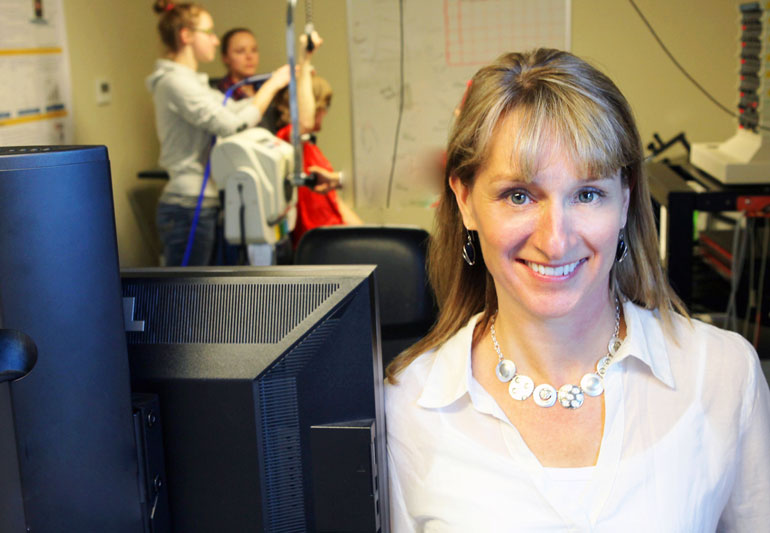
Jennifer Jakobi, professor in the School of Health and Exercise Sciences.
UBC Okanagan research shows strength training is effective
Physical exercise may not be top of mind for older adults during the COVID-19 outbreak. But according to one UBC Okanagan researcher, strength training can be an effective way to stay healthy while at home.
A recent study from UBCO professor Jenn Jakobi shows that strength training with free-weights that progresses in intensity is effective in combating declining health often observed with adult aging.
“Inactivity and social isolation are key contributors to age-related frailty,” says Jakobi. “While social isolation is a complex challenge these days, there is absolutely some work we can do on enhancing exercise at home.”
She adds that physical movement and exercise, inclusive of weight training, can be readily adapted for the home but advises that anyone looking to start a new exercise program should consult with their physician first.
Jakobi, a professor in UBC Okanagan’s School of Health and Exercise Sciences, defines frailty as reduced function and health in older adults. Features include unintentional weight loss, slow walking speed, muscle weakness, fatigue and low activity levels. If left unchecked this may lead to declines in health and functional independence which might require longer-term care.
“Age isn’t necessarily always associated with being frail, and frailty isn’t reserved for just old age—it can occur at any point in adulthood,” says Jakobi. “Yet, it is dynamic and can be reversed. Maintaining and building muscle strength is key.”
Jakobi and her research team wanted to explore whether progressive-resistance exercises can be effective at altering the path to this vulnerability.
After an initial screening of 53 older adults, the lab-based study evaluated 21 pre-frail women over the age of 65, divided into two groups. One group participated in a progressively intense free weight exercise program three-times-a-week for 12 weeks. Their exercises mimicked movements of normal life, and which may become difficult for some as they age.
“For example, we asked participants to complete a series of squats, replicating sitting-down and standing up,” explains Nick Bray, former UBCO graduate student and co-author of the study. “We also asked them to perform dead-lifts, which mimic picking-up groceries.”
The other group simply maintained their normal routines.
Measurements of muscle strength and performance were compared between the groups after the 12-week session. Not only did the exercise group improve their muscle performance and become less frail, they did so without injury.
“The exercise group improved in all measures including walking speed, grip strength and sit-to-stand time,” says Jakobi. “Also, these changes were seen as early as nine weeks into the program.”
She adds that their findings dispel the myth of strength training being unsuitable for pre-frail older adults.
“Traditionally, older adults opt for low-intensity, and low-resistance exercise because they believe that heavy free-weight exercise isn’t right for them. Our findings show the opposite.”
Although the research into heavy resistance training is novel and in its early phases this style of exercise is showing great promise. None of the exercise participants opted-out of the program or reported negative events and all improved in functional movement.
To help those interested in using this new research in their home during this period of physical distancing, Jakobi and her team have created an exercise worksheet and other at-home resources that highlight beginning phases of these progressive movements.
“This type of activity is appropriate and can be enjoyable,” says Jakobi. She suggests just going for it.
“Try something new and lift progressively more. You should feel a good healthy challenge.”
This study was recently published in The Journal of Frailty and Aging and was funded by the Canadian Institutes of Health Research.